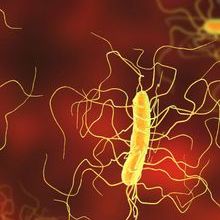Do gut bacteria influence colon cancer progression, and how can diet help?
14 July 2021

Changes in protein or fibre content of a person’s diet can increase bacteria that are linked to colorectal cancer.
Certain species of bacteria, such as Fusobacterium nucleatum and Parvimonas micra have been linked to colorectal cancer based on enrichment in cancerous lesions. Avery Robinson, PhD Candidate at the University of Guelph, Canada, is investigating how diet affects bacterial metabolites produced by the microbiome.
The model the team used allows researchers to investigate the direct impact of diet on bacterial communities collected from people with colorectal cancer, and how these changes might impact colon cells. “The truly exciting aspect of this research is the power of combining complex gut community modelling with in vitro colonic organoid culture for studying interactions between gut microbial metabolites and human colonic cells in a tightly controlled manner,” explained Robinson.
They found that when given a high protein diet, the model bacterial ecosystem contained higher levels of the bacteria Fusobacterium nucleatum and Parvimonas micra, both of which are associated with colorectal cancer. “It was surprising to see such a clear enrichment of colorectal cancer-linked species,” said Robinson.
Depending on which diet gut microbes are provided, levels of metabolites produced by the gut microbiome vary. Changes in diet can have a profound impact on this complex community of micro-organisms that reside in the gut, according to Robinson. She said, “microbes capable of metabolising substrates that are abundant in a new diet can become enriched within the gut community of the host consuming that diet. Depending on the substrates in this diet and the range of substrates a given microbe can use, microbes may shift their metabolic strategies. Consequently, different microbial metabolites, and different concentrations of metabolites, may be produced as a result of consuming this new diet.
“The gut microbiota and human colonic cells are in constant communication via metabolite flux,” she said. “Shifts in gut microbial metabolites could have impacts that range from beneficial – for example, by encouraging colonic epithelial integrity – to unfavourable, such as promoting inflammation.”
Gut micro-organisms are understood to have a wide-ranging impact on human health in both positive and negative ways, according to Robinson. “The influence of the gut microbiota on human health in general, not just colonic health, is an exciting field of research. Shifts in gut microbiota function brought on by diet may affect human health in a wide variety of ways that are not yet well understood, and could definitely have an impact beyond the GI tract.”
Avery Robinson will present her data at the Microbiology Society’s Focused Meeting Anaerobe 2021: The Microbiota and Beyond. Her talk, titled ‘Protein- and fibre-enriched diets modify the structure and function of a defined colorectal cancer patient gut community and modulate colon organoid transcriptional response’, will take place at 15:00 on Thursday 15 July, 2021.
Image: iStock/DrMicrobe.


